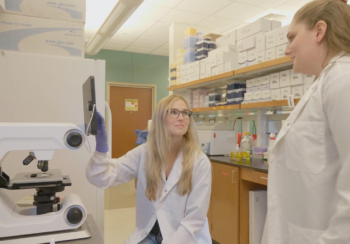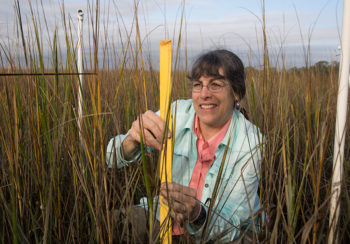The Center for Bioenergy Innovation (CBI), a multi-institutional initiative based at Oak Ridge National Laboratory and co-led by University of Georgia researchers, has been renewed by the U.S. Department of Energy as one of four bioenergy research centers across the nation that advance robust, economical production of plant-based fuels and chemicals.
According to its announcement, DOE will provide $590 million to the centers over the next five years, of which UGA will receive $14 million. Initial funding for the four centers will total $110 million for fiscal year 2023. Outyear funding will total up to $120 million per year over the following four years.
CBI is one of several federally supported centers with ties to UGA’s Complex Carbohydrate Research Center (CCRC), an interdisciplinary research unit that optimizes cooperation and collaboration among various disciplines of carbohydrate (glyco-) science, including biomedical glycoscience, plant and microbial glycoscience and synthetic and analytical chemistry.
“We are excited to be in our 16th year of funding: the first 10 years from the DOE-funded BioEnergy Science Center (BESC) and the past 5-plus years from the CBI,” said Debra Mohnen, Distinguished Research Professor and Georgia Athletic Association Professor in the CCRC and research domain manager for integrative analysis and understanding for CBI. “UGA has been a major university hub within both BESC and CBI.”
In addition to Mohnen, C.J. Tsai, Winfred N. “Hank” Haynes Professor and Georgia Research Alliance Eminent Scholar in the Franklin College of Arts & Sciences, serves as CBI’s research domain manager for accelerative science. Also, Breeanna Urbanowicz, CCRC researcher and assistant professor in Franklin’s Department of Biochemistry & Molecular Biology, sits on CBI’s Research Council and Katrien Devos, Distinguished Research Professor in the Department of Crop and Soil Sciences serves as switchgrass team lead.
Over the next five years, CBI will focus on developing sustainable aviation fuel, working with its national laboratory, university and industry partners to take a multipronged approach. Specific research areas include:
- Developing perennial crops that require less water and fertilizer and yield high amounts of biomass with the desired qualities for conversion to biofuel and bioproducts
- Refining a bioprocessing and co-treatment procedure using custom microbes to break down plants and ferment intermediate chemicals
- Advancing the extraction of lignin from plants and chemically converting it into aviation fuel
- Improving intermediate bioproducts that can be blended with conventional fuel to significantly reduce carbon emissions
CBI intends to reach Tier 1 validation of its jet biofuel, an aviation industry standard that determines if the fuel’s properties are fit-for-purpose in existing and future airplane fleets. The development of renewable fuels is a key strategy to reduce carbon dioxide emissions from commercial aircraft.
Many UGA faculty are supported as project leads from the CBI funding. Their work has spanned characterization of plant cell walls (plant biomass) to studies on poplar and switchgrass as bioenergy feedstocks for biofuels.
“We work in earnest trying to move to a sustainable economy, as we are well aware of the threat to climate stability,” Mohnen said. “Researchers at UGA and other researchers in CBI are working diligently to make the breakthroughs needed to accomplish these goals. We are all mindful that success is critical.”
“To meet our future energy needs, we will need versatile renewables like bioenergy as a low-carbon fuel for some parts of our transportation sector,” U.S. Secretary of Energy Jennifer M. Granholm said. “Continuing to fund the important scientific work conducted at our Bioenergy Research Centers is critical to ensuring these sustainable resources can be an efficient and affordable part of our clean energy future.”
UT-Battelle manages ORNL for DOE’s Office of Science. The Office of Science is the largest supporter of basic research in the physical sciences in the U.S. and is working to address some of the most pressing challenges of our time. For more information, please visit http://science.energy.gov/.






